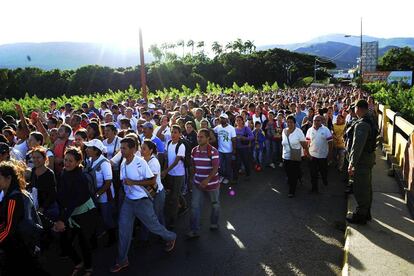Over 35,000 Venezuelans cross into Colombia to buy rice, oil and flour
Nicolás Maduro administration allows crossing for one day due to recurring shortages of staple foods

Hundreds of people stood in line on Sunday on the sidewalks of Sixth Avenue, in downtown Cúcuta, carrying as many bags as they could manage. They made up the more than 35,000 Venezuelans who crossed into Colombia that day to buy staple foods and other basic products.
Neither the weight of their load nor the fact that they spent the equivalent of two months’ minimum wage (15,000 bolívares, around $15 at black market rates) could deter Venezuelan shoppers as they filled their carts with oil, sugar, flour, bread, coffee, milk and toilet paper. They had been waiting for this day for nearly a year, after Venezuelan president Nicolás Maduro decided to shut down his side of the border, citing the need to crack down on smuggling.
The decision to open the border temporarily came shortly after a group of 500 women calling themselves Las Damas de Blanco (The Ladies in White) pressured border agents into letting them through to buy food and medicine for their families.
Humanitarian corridors to assist schoolchildren and the sick remain open since August of last year
“We knew something could happen, but we were not expecting this massive arrival,” said David Castro, manager of Los Montes supermarket, which registered a 190% rise in sales compared with ordinary Sundays since the border shutdown.
“Although we were missing a few products due to a transportation strike, the essential ones, the ones they buy, were in stock,” added Castro.
In order to serve the thousands of Venezuelans who descended on the establishment, Los Montes upped its personnel to 40 from the usual 10, closed its doors at certain hours of the day to control the flow of shoppers, and provided free buses to the border.
Standing in line awaiting the bus that would take them back to Venezuela, a group of women who declined to give their names opened up their grocery bags to reveal their purchases.
Sign up for our newsletter
EL PAÍS English Edition has launched a weekly newsletter. Sign up today to receive a selection of our best stories in your inbox every Saturday morning. For full details about how to subscribe, click here.
“I’ve spent around 5,000 pesos ($17) in San Cristóbal. I could no longer find sanitary pads or medicine for headaches,” explains one.
“If they open up again tomorrow, I am coming back. I don’t mind spending all my money. There’s nothing left in Venezuela,” says another.
Police officers accompanied the visitors throughout their time in Colombia to ensure that their journey would be trouble-free.
“An operative of 1,000 men worked to make sure their transit was peaceful,” said Gustavo Moreno, head of the border police. “No incidents were reported.”
Before boarding the buses, some Venezuelans cried out: “Thank you Colombia! Long live Colombia!” For many of them, it had been a long time since they’d seen so much food together at a store. Some shoppers, such as Efraín López, who lives in the state of Falcón, traveled 13 hours for the chance to cross into Colombia.
When the border was closed, much of the activity in the area ceased altogether: the currency exchange stands, the drivers offering to help carry products from one side to the other. Now, though, some of the former bustle has returned to the area.
We knew something could happen, but we were not expecting this massive arrival
David Castro, Los Montes supermarket manager
“We’ve made twice as many sales,” says one cashier at a grocery store named El Triunfo. On the floor next to her there was a paper bag where she placed the bolívar notes. “We charge a 0.25 surplus,” she explains.
At 8pm, as the border shut down again, police officers, military personnel, immigration agents and Tax Agency inspectors at the Colombian checkpoint went over people and bags to make sure there was nothing inside except food and supplies. A few meters away, Venezuelan guards looked on but did not request any form of ID.
“Most of them made it back,” says Víctor Bautista, who advises the Colombian Foreign Ministry on border issues. “The working sessions between both countries remain open, and both ministers are going to meet before 20 days have elapsed.”
Meanwhile, humanitarian corridors to assist schoolchildren and the sick remain open since August of last year. Venezuelans remain hopeful that the border will reopen again. But nobody knows for sure which way the Maduro administration will turn.
English version by Susana Urra.
Tu suscripción se está usando en otro dispositivo
¿Quieres añadir otro usuario a tu suscripción?
Si continúas leyendo en este dispositivo, no se podrá leer en el otro.
FlechaTu suscripción se está usando en otro dispositivo y solo puedes acceder a EL PAÍS desde un dispositivo a la vez.
Si quieres compartir tu cuenta, cambia tu suscripción a la modalidad Premium, así podrás añadir otro usuario. Cada uno accederá con su propia cuenta de email, lo que os permitirá personalizar vuestra experiencia en EL PAÍS.
¿Tienes una suscripción de empresa? Accede aquí para contratar más cuentas.
En el caso de no saber quién está usando tu cuenta, te recomendamos cambiar tu contraseña aquí.
Si decides continuar compartiendo tu cuenta, este mensaje se mostrará en tu dispositivo y en el de la otra persona que está usando tu cuenta de forma indefinida, afectando a tu experiencia de lectura. Puedes consultar aquí los términos y condiciones de la suscripción digital.









































